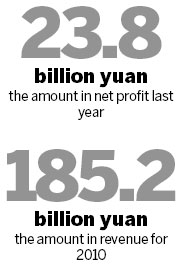Business
Huawei boosted by international sales
Updated: 2011-04-19 10:56
By Shen Jingting and Wang Xing (China Daily)
BEIJING - Huawei Technologies Co Ltd, China's biggest telecommunication equipment maker by sales, said on Monday that its net profit rose by 30 percent to 23.8 billion yuan ($3.64 billion) last year, as robust demand from overseas markets boosted sales.
The company said that its revenue for 2010 was 185.2 billion yuan ($28.35 billion), up 24.2 percent from a year earlier, according to a statement.
Analysts said that Huawei's rapid growth is expected to continue, despite recent setbacks in overseas expansion in the United States and disputes with foreign rivals over intellectual property rights.
"Despite the very complex global market, Huawei achieved sustainable growth in 2010," the company said.
According to Huawei, sales from overseas markets reached 120.4 billion yuan, a 33.8 percent year-on-year growth, and revenue from the Chinese market registered a modest increase of 9.7 percent, to 64.8 billion yuan.
Wang Yuquan, a senior consultant with the research company Frost & Sullivan, said that Huawei's performance was derived from fast-growing emerging economies, which grew much faster than that in mature markets.
"Although many reports last year said that Huawei experienced major setbacks in expanding into countries such as the United States, where the market growth is not as fast as many emerging markets, which Huawei has much more involvement," Wang said.
He said that Huawei, which became the world's second-largest telecom equipment maker in 2009, is expected to have a steady growth rate in the years to come. In the next couple of years, that will help Huawei catch up with market leader Telefon AB LM Ericsson, which posted sales worth 203.3 billion Swedish krona ($32.9 billion) - a 2 percent drop - in 2010, Wang said.
|
|
Funded by Ren Zhengfei, a former Chinese military officer, the privately owned Huawei has become one of the world's biggest and fastest-growing telecom equipment makers. However, the company's attempts at overseas expansion, especially to mature markets such as the United States, has often been blocked by foreign governments.
In February, Huawei, under pressure from the Committee on Foreign Investment in the United States (CFIUS), abandoned its efforts to acquire the US computer company 3Leaf Systems.
The company's Deputy Chairman Ken Hu later wrote an open letter saying that claims of Huawei's links with the Chinese military were "falsehoods" and that it is fully prepared to cooperate with US officials.
Huawei has made public the members of its board, in an attempt to improve transparency to better address US concerns.
A Huawei official told China Daily on Sunday that the US expansion setback may force Huawei to shift its focus from the United States to Europe, where governments and telecom carriers are "more open to investment by foreign telecom companies".
The official, who declined to be named, said that the European market, which accounts for about 30 percent of Huawei's total overseas revenue, will present "the most opportunities for the company" in the years to come.
Huawei's sales revenue in the telecom network equipment sector reached 122.9 billion yuan in 2010, a 23 percent year-on-year increase, according to the company. Huawei also shipped more than 120 million telecom terminals worth a total of $4.5 billion in 2010.
Ken Hu said that using Huawei's experience in the telecom industry, the company plans to expand into new areas, including the enterprise and personal consumer device business.
On Thursday, Huawei announced that it had reached a settlement with Motorola Solutions Inc over a legal dispute regarding an infringement of Huawei's intellectual property rights. Motorola agreed to pay an undisclosed amount to Huawei.
Analysts said that the agreement allowed Motorola to move forward in the sale of its telecom equipment unit to Nokia Siemens Networks, which is still waiting approval from Chinese regulators.
China Daily
Specials

In the swim
Out of every 10 swimsuits in the world, seven are made in China.

Big spenders
Travelers spend more on shopping than food, hotels, other expenses

Rise in super rich
Rising property prices and a fast-growing economy have been the key drivers.
